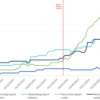Why do some young men turn to crime, while others don’t? An international study shows that preferences such as risk tolerance, impatience and altruism as well as self-control can predict who will commit crime. Risk-tolerant, impatient young men are more likely to commit property crime, while people with low self-control tend to commit violent, drug and sexual offenses.
According to economic theory, risk-tolerant, impatient and selfish people with a low level of education are more likely to commit crime than people who are highly educated, risk averse, patient and selfless. However, confirming this hypothesis with scientific methods isn’t that easy. The education levels and socioeconomic factors of convicted criminals can be compared with those of the general population relatively easily. But assessing people’s risk tolerance, patience and altruism is much more difficult.
Education main indicator for delinquency
An international team of economists has now published a study that links data on risk, time and social preferences of young men to factors such as education, income, self-control and criminal records. The findings confirm that education is the strongest indicator for determining whether young men will commit crime. Risk tolerance and impatience also significantly predict criminal behavior. Both preferences continue to play a role even if further factors such as income, area of residence, birth order, socio-economic or immigrant status are taken into account. The crime propensities of the most risk-tolerant people are 8 to 10 percentage points higher compared to the most risk-averse.
Preferences can predict type of crime
“The role that risk tolerance and patience play when it comes to crime propensity needs to be taken into account for crime prevention strategies,” says UZH professor and study co-author Ernst Fehr. “The people who are most prone to commit crimes are also those who are least responsive to stricter sanctions.”
Survey experiment among 5,400 young Danes
The study involved a behavioral experiment among 5,400 young Danish men aged between 15 and 20 in which they could earn the equivalent of between CHF 30 and 50. The participants had to complete a series of decision tasks, which were used to determine their risk, time and social preferences. Risk preferences indicate whether a person is more likely to choose a small but certain amount of money or go for a larger, uncertain sum. Time preferences measure a person’s patience and describe their willingness to forgo a smaller payout today in favor of a larger sum at a later time. Social preferences indicate how envious or altruistic an individual is. The survey also included a question about the participants’ self-assessed capacity to exercise self-control.
The study is published in PNAS.
More information:
Ernst Fehr et al, Preferences predict who commits crime among young men, PNAS (2022). DOI: 10.1073/pnas.2112645119
Provided by
University of Zurich
Citation:
Understanding who commits which crimes (2022, January 31)



